2020.01.08
- 調査・研究
© 2020 SASAKAWA SPORTS FOUNDATION
© 2020 SASAKAWA SPORTS FOUNDATION
スポーツ政策研究所を組織し、Mission&Visionの達成に向けさまざまな研究調査活動を行います。客観的な分析・研究に基づく実現性のある政策提言につなげています。
自治体・スポーツ組織・企業・教育機関等と連携し、スポーツ推進計画の策定やスポーツ振興、地域課題の解決につながる取り組みを共同で実践しています。
「スポーツ・フォー・オール」の理念を共有する国際機関や日本国外の組織との連携、国際会議での研究成果の発表などを行います。また、諸外国のスポーツ政策の比較、研究、情報収集に積極的に取り組んでいます。
日本のスポーツ政策についての論考、部活動やこどもの運動実施率などのスポーツ界の諸問題に関するコラム、スポーツ史に残る貴重な証言など、様々な読み物コンテンツを作成し、スポーツの果たすべき役割を考察しています。
2020.01.08
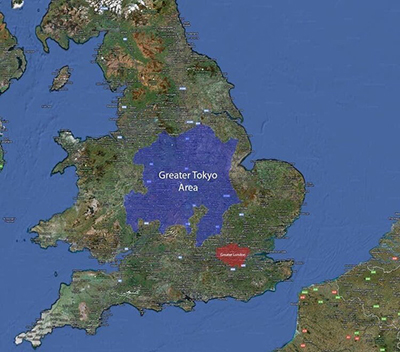
The Japanese archipelago has 6,852 islands but only about 430 are inhabited; in my 16 visits I’ve been to just 8 islands so far. Although the total land mass of Japan is around twice the size of the UK, most of the country is covered by forest and mountains; as a result 90% of the 126 million population live in very concentrated urban areas. The picture to the right shows just how much bigger Greater Tokyo is compared to Greater London.
Looking back to before the Summer Olympic Games were held in Tokyo in 1964, the number of tourists to Japan was only about 350,000 per year. However, the Games acted as a catalyst for economic growth in the country. There was a big investment in the infrastructure including the first Shinkansen (or bullet train) line which connected Tokyo to Osaka and the triple level superhighways. Fast forward 56 years and the target for 2020 is for Japan to welcome an impressive 40 million visitors. They will also be launching the latest model of the Shinkansen.
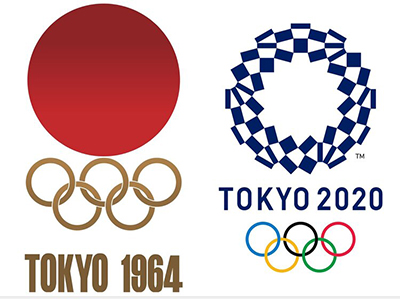
The 2018 Pyeongchang Winter Olympics has been hailed as the most tech-centric ever, but there is no doubt that Tokyo 2020 will raise the bar again and be the most digitised Olympics in history; every athlete, spectator and device will be connected.
Companies like Cisco, who have supported the Olympics for the past decade including Beijing 2008, London 2012 and Rio 2016, are the official network equipment provider. Multi-lingual digital signage and WIFI services have been installed as part of the digital leap. Kyoto has become the first Cisco Smart City in Japan; it is estimated a quarter of all tourists will visit this historic city. Technology firms Alibaba Cloud and Intel have unveiled plans for joint work on broadcast related technology which includes 360-degree 8K image definition delivered over 5G mobile networks.
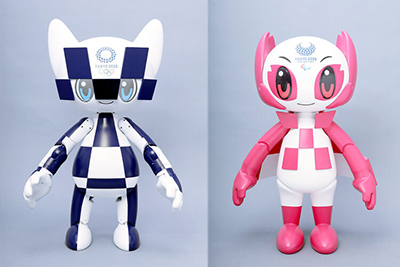
The Tokyo 2020 Robot Project is a unique opportunity for Japan to showcase its advanced technology. The Human Support and Delivery Support Robots both aid spectators in wheelchairs whilst Power Assist Suits help with lifting heavy objects. Toyota’s Remote Location Communications Robot is there to capture life-size real-time video for people unable to attend the games.
Toyota will also offer self-driving taxi rides with its fleet of Level 4 autonomous vehicles. Whilst Japan’s space agency has launched a rocket capable of delivering an artificial meteor shower into the Earth’s atmosphere ready for the opening ceremony.
It’s not just technology that Japan will showcase in 2020 but also, its new sports venues. Although eSports is not part of the Olympic Games (yet), a 12-storey eSports arena will be built in the heart of Tokyo next year. Back in 1964, the futuristic flying-saucer shaped Tokyo Metro Gymnasium was the venue for gymnastics. For 2020, the new Ariake Gymnastics Centre has been completed and was handed over during my visit.
ASICS have opened a new sports complex in Tokyo Bay and I was fortunate enough to visit it. Covering 50,000 square feet, this new urban sports complex is the world’s largest facility for training in low-oxygen conditions. The oxygen levels can be adjusted in the fitness area, the swimming pools and the three smaller specialist training labs. The air density can be changed from ‘normal’ oxygen levels up to the conditions experienced at 4,000m altitude; this takes hypoxic training to a new level, so to speak! I got to try a workout in the gym at almost 3,000m while my red blood cells were monitored.
Against this backdrop of preparation for the Olympics and Paralympics, the recent Rugby World Cup served as a successful tourism warm up. “Japan 2019 will be remembered as probably the greatest World Cup…We’ve broken records at every level: attendance, fanzones, broadcast, digital, and social media, but really this is only part of the story. The success of this tournament has been personified by the warmth and passion of the Japanese people” said the World Rugby chairman, Sir Bill Beaumont.
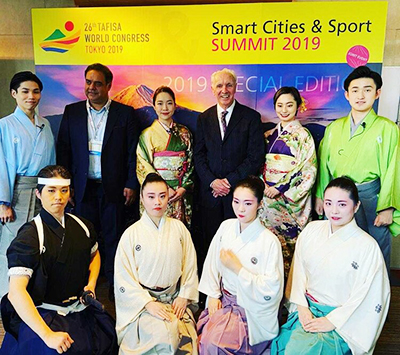
The Association for International Sport for All (TAFISA) held its 26th World Congress in Tokyo in November. For the first time in its history, TAFISA joined forces with Smart Cities & Sport for a unique event. During the conference, TAFISA launched their 2030 mission ‘For a Better World Through Sport for All’ which was attended by over 70 countries and 600 delegates.
Alongside TAFISA, the Japan Sport Association, Japan Health Promotion & Fitness Foundation, National Recreation Association of Japan and Sasakawa Sports Foundation all aim to promote Sport for All in Japan.
Speakers provided good practice examples of sport building bridges and bringing people together. Innovations in the industry are disrupting traditional delivery of sport whilst new technologies provide improved data on participation.
Whilst at TAFISA, I spoke about how a ‘triathlon’ of apps know more about activity levels and duration than ever before. There is no limit to data for apps like Strava who have tracked 700 million activities including swimming, running and cycling and even Google who have recently acquired FitBit.
I also discussed how sports technology peaked when long-distance runner, Eliud Kipchoge, successfully ran a 1:59 marathon. The multi-layered assistance ranging from amended road surfaces, specialist trainers to pacemakers meant Kipchoge's run could not be counted as a world record but it proves that science and technology advancements mean #nohumanislimited.
Tokyo, the most populous city in the world with over 38 million inhabitants, will be the perfect host in 2020. The Games will provide an opportunity for Japan to show the rest of the world their latest innovations along with their beautiful country, culture, people, quality of service and amazing hospitality.
レポート執筆者
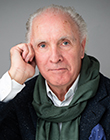
David Minton
Founder, LeisureDB
LeisureDB for the most accurate and insightful data and reporting on the fitness industry.
https://www.leisuredb.com/
Special Advisor, Sasakawa Sports Foundation